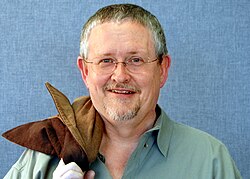Orson Scott Card Quote
She had always thought that if only people could communicate mind-to-mind, eliminating the ambiguities of language, then understanding would be perfect and there'd be no more needless conflicts. Instead she had discovered that rather than magnifying differences between people, language might just as easily soften them, minimize them, smooth things over so that people could get along even though they really didn't understand each other. The illusion of comprehension allowed people to think they were more alike than they really were. Maybe language was better.
Orson Scott Card
She had always thought that if only people could communicate mind-to-mind, eliminating the ambiguities of language, then understanding would be perfect and there'd be no more needless conflicts. Instead she had discovered that rather than magnifying differences between people, language might just as easily soften them, minimize them, smooth things over so that people could get along even though they really didn't understand each other. The illusion of comprehension allowed people to think they were more alike than they really were. Maybe language was better.
Related Quotes
Language and hearing are seated in the cerebral cortex, the folded gray matter that covers the first couple of millimeters of the outer brain like wrapping paper. When one experiences silence, absent...
Michael Finkel
Tags:
activated, ancient, bedrock, brain, busy, cerebral cortex, deeper, experiences, gray matter, hearing
About Orson Scott Card
Orson Scott Card (born August 24, 1951) is an American writer known best for his science fiction works. As of 2024, he is the only person to have won a Hugo Award and a Nebula Award in consecutive years, winning both awards for his novel Ender's Game (1985) and its sequel Speaker for the Dead (1986). A feature film adaptation of Ender's Game, which Card coproduced, was released in 2013. Card also wrote the Locus Fantasy Award-winning series The Tales of Alvin Maker (1987–2003). Card's fiction often features characters with exceptional gifts who make difficult choices with high stakes. Card has also written political, religious, and social commentary in his columns and other writing; his opposition to homosexuality has provoked public criticism.
Card, who is a great-great-grandson of Brigham Young, was born in Richland, Washington, and grew up in Utah and California. While he was a student at Brigham Young University (BYU), his plays were performed on stage. He served in Brazil as a missionary for the Church of Jesus Christ of Latter-day Saints (LDS Church) and headed a community theater for two summers. Card had 27 short stories published between 1978 and 1979, and he won the John W. Campbell Award for best new writer in 1978. He earned a master's degree in English from the University of Utah in 1981 and wrote novels in science fiction, fantasy, nonfiction, and historical fiction genres starting in 1979. Card continued to write prolifically, and he has published over 50 novels and 45 short stories.
Card teaches English at Southern Virginia University; he has written two books on creative writing and serves as a judge in the Writers of the Future contest. He has taught many successful writers at his "literary boot camps".
Card, who is a great-great-grandson of Brigham Young, was born in Richland, Washington, and grew up in Utah and California. While he was a student at Brigham Young University (BYU), his plays were performed on stage. He served in Brazil as a missionary for the Church of Jesus Christ of Latter-day Saints (LDS Church) and headed a community theater for two summers. Card had 27 short stories published between 1978 and 1979, and he won the John W. Campbell Award for best new writer in 1978. He earned a master's degree in English from the University of Utah in 1981 and wrote novels in science fiction, fantasy, nonfiction, and historical fiction genres starting in 1979. Card continued to write prolifically, and he has published over 50 novels and 45 short stories.
Card teaches English at Southern Virginia University; he has written two books on creative writing and serves as a judge in the Writers of the Future contest. He has taught many successful writers at his "literary boot camps".
